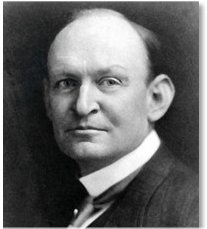 |
Archibald Thomas Robertson
Archibald Thomas Robertson was born near Chatham, Virginia, but grew up on a farm in North Carolina. In 1876, he was baptized and began his lifelong loyalty to the Southern Baptist Church. After graduating from Wake Forest College, he enrolled in the Southern Baptist Theological Seminary at Louisville, Kentucky and received the Th.M. in 1888. In 1892 Robertson was appointed professor at Southern Baptist and remained in that post until a day in 1934 when he dismissed his class early and went home and died of a stroke.
|
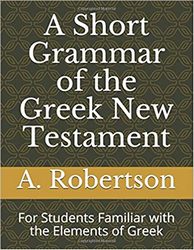
|
A Short Grammar of the Greek New Testament:
For Students Familiar with the Elements of Greek
A.T. Robertson was a genius with translating the nuances between Hebrew, Greek, Koine Greek and English. Here he explains the linguistical differences in a comprehensible manner.
|
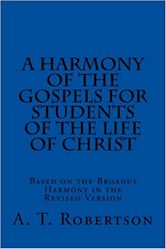
|
A Harmony of the Gospels For Students Of The Life of Christ:
Based on the Broadus Harmony in the Revised Version
This reprint is a facsimile scan of the original 1922 document published by George H. Doran Company. Other reprints of this document have used the OCR (optical character recognition) and many errors are found in the text. We elected to go a further step to scan and remove the background color image to further enhance and sharpen the page. We have enlarged the borders to accommodate the presentation of the entire original pages including the original borders and page numbers. In order to maintain integrity of the original page numbering , table of contents, and indexes, we have left these intact. For this reason you will see two page numbers on each page. One page number is from the original document. We have added a second page number at the bottom of each page to aid the reader. Other than removal of page color and the removal of blank pages, the document is exactly as the original.
|
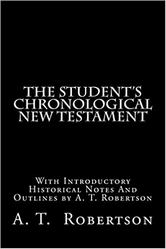
|
The Student's Chronological New Testament:
With Introductory Historical Notes And Outlines by A. T. Robertson
From the preface:
There is no edition of the New Testament in a standard translation which is acceptable for general use and which also presents the books in probable chronological order. In this edition by special arrangement the best English version in existence is used, the American Revision. Each book had a definite aim, grew out of specific historical circumstances, and had a message for its time. If we can see that message clearly, we shall be able the better to grasp the message of God's Word for our time.
|
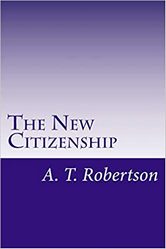
|
The New Citizenship:
The Christian Facing a New World Order
In this volume, A. T. Robertson reflects on the issues and challenges facing the church in the early twentieth century—the years of war, economic turmoil, the relationship between church and state, patriotism and pacifism. He explores the implication of Christ’s kingdom with regard to each challenge the church faces, and suggests possibilities for engaging complex issues. The posture and approach of his engagement with culture serves as a model for the church in every age.
|
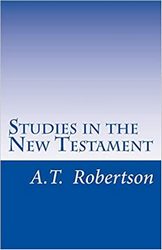
|
Studies in the New Testament:
Handbook For Bible Classes of Every Kind
The aim of A. T. Robertson’s classic Studies in the New Testament is to make the New Testament more intelligible and more easily taught to others. The book is not meant for technical scholars or students in theological seminaries. Instead, Robertson writes to the average teacher in the Sunday school, the adult Bible class, boys and girls in the high schools, those in their first year or so in college, and preachers with little scholastic training. With its “Topics for Review” and “Questions for Review and Examination,” it is adapted for use in Sunday school and Bible institutes and in all teacher-training work. There are no references to books of any kind outside of the Bible. The chapters are divided into numerous paragraphs, each paragraph dealing with a single idea.
|
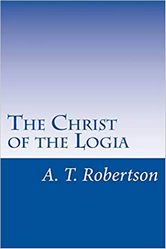
|
The Christ of the Logia
The essays in the present book deal with the greatest question of all the ages, that put by Jesus to the Pharisees and Sadducees at the close of the great temple debate: "What think ye of the Christ?" (Matt. 22:42) . That question is still the touchstone of all high thinking and right living. Old Simeon had said of the Babe: "Behold, this cJmld is set for the falling and the rising of many in Israel" (Luke 2: 34). And Jesus boldly denounced the conspirators at the end who had rejected Him: "And he that falleth on this stone shall be broken jto pieces: but on whomsoever it shall fall, it will scatter him as dust" (Matt. 21:44). The world has tried to do without Jesus, but it has failed. Men have tried hypocrisy, but Jesus at last uncovers the wolf beneath the sheepskin. They have denounced Him as a dreamer and as in the way] of the progress of the superman, but the very wrath of man has turned to praise at last. The law of the jungle in war and rapine and selfishness have driven man back to the foot of the Cross. From the Preface
|
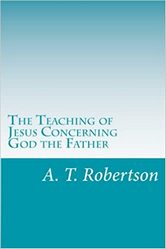
|
The Teaching of Jesus
Concerning God the Father
PREFACE The object of this volume is to tell in straightforward manner the message Of Jesus concerning God the Father. The book is written after much study of what men have written concerning God and in sympathy with all the truth that modern scholarship has to Offer on this great theme. But in har mony with the plan Of the series no references to the literature Of the subject cumber the pages. The bulk Of the book is the result of direct exegesis of the words of Jesus. We come reverently with Philip to Jesus and say: Lord, Show us the Father, and it sufficeth us.
|
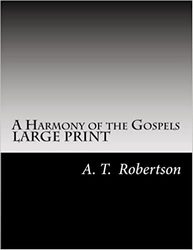
|
A Harmony of the Gospels For Students Of The Life of Christ:
Based on the Broadus Harmony in the Revised Version
PREFACEIt is now just thirty years since one day his young assistant suggested to Dr. John A. Broadus that he prepare a harmony of the Gospels that should depart from the old plan of following the feasts as the turning points in the life of Jesus. He acted on the hint and led the way that all modern harmonies have followed. The book has gone through a dozen large editions and has become the standard harmony for many thousands of students all over the world. Broadus was concerned to bring out "the inner movements of the history, towards that long-delayed, but foreseen and inevitable collision, in which, beyond all other instances, the wrath of man was made to praise God." This he succeeded in doing with marvelous power.
|








